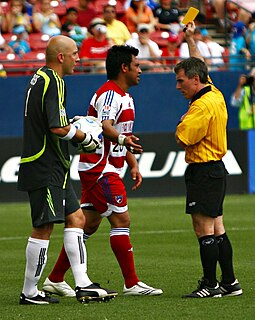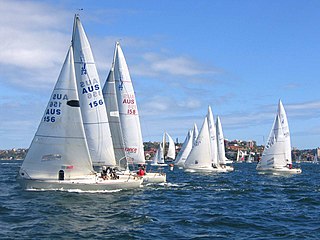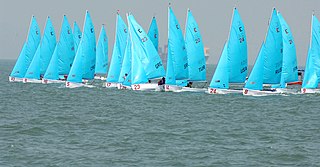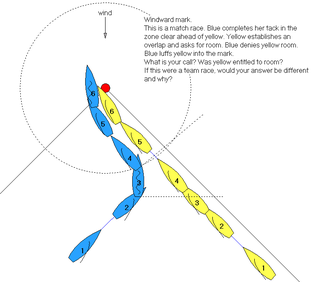This page is based on this
Wikipedia article Text is available under the
CC BY-SA 4.0 license; additional terms may apply.
Images, videos and audio are available under their respective licenses.
A match race is a race between two competitors, going head-to-head.

Sailing/Yachting made its first appearance as an Olympic sport at the 1900 Summer Olympics after competitions were cancelled at the 1896 Olympics. With the exception of 1904, sailing was thereafter always a part of the Olympic program. The sailing program in 1900 consisted of a total of eight sailing classes. For six classes, the races were scheduled from 20 – 27 May at the river Seine around Meulan, and a series of three races was held for the largest classes from 1 – 5 August on the North Atlantic off the coast of Le Havre. Approximately 150 sailors in 64 boats from 6 nations competed, including 1 woman, Hélène de Pourtalès, who won a gold medal in the 1 to 2 ton.
Team racing, also known as team sailing, is a popular form of dinghy racing and yacht racing. Just 2 teams compete in a race, each team sailing 2, 3, or 4 boats of the same class. The winning team is decided by combining the results of each team's boats. This differs from an inter-club fleet race where boats from 3 or more clubs compete. Then the results of each club's boats are combined to give their club's overall position.

A referee or simply ref is the person of authority in a variety of sports who is responsible for presiding over the game from a neutral point of view and making on-the-fly decisions that enforce the rules of the sport, including sportsmanship decisions such as ejection. The official tasked with this job may be known, in addition to referee, by a variety of other titles as well, including umpire, judge, arbiter, arbitrator, linesman, commissaire, timekeeper, touch judge or Technical Official.

Dinghy racing is a competitive sport using dinghies, which are small boats which may be rowboats, have an outboard motor, or be sailing dinghies. Dinghy racing has affected aspects of the modern sailing dinghy, including hull design, sail materials and sailplan, and techniques such as planing and trapezing.

World Sailing (WS) is the world governing body for the sport of sailing recognized by the International Olympic Committee and the International Paralympic Committee (IPC).

The International 420 Class Dinghy is a double-handed monohull planing dinghy with centreboard, bermuda rig and center sheeting. The name describes the overall length of the boat in centimeters. The hull is fiberglass with internal buoyancy tanks. The 420 is equipped with spinnaker and optional trapeze. It has a large sail-area-to-weight ratio, and is designed to plane easily. It can be rigged to be sailed single-handed.

The J/24 is an international One-Design keelboat class as defined by the International Sailing Federation. The J/24 was created to fulfill the diverse needs of recreational sailors such as cruising, one design racing, day sailing, and handicap racing.
In professional sports, a replacement player is an athlete who is not a member of the league's players association and plays during a labor dispute such as a strike or lockout, serving as a strikebreaker.

Formula Windsurfing is the high-performance, competitive course-racing format of the windsurfing world. This type of sailing boards enjoy a massive wind range that enables racing in winds from 7 to 35 knots, and are capable of reaching speeds of over 30 knots.

A radio-controlled boat is a boat controlled remotely with radio control equipment.

Sailing has been one of the Olympic sports since the Games of the I Olympiad, held in Athens, Greece, in 1896. Despite being scheduled in the first Olympic program, the races were canceled due to severe weather conditions. Apart from the 1904 Summer Olympics, sailing has been present in every edition of the Olympic Games.

Sailing as a sport involves a variety of competitive sailing formats that are sanctioned through various sailing federations and yacht clubs. Racing disciplines include matches within a fleet of sailing craft, between a pair thereof or among teams. Additionally, there are specialized competitions that include setting speed records. Racing formats include both closed courses and point-to-point contests; they may be in sheltered waters, coast-wise or on the open ocean. Most competitions are held within defined classes or ratings that either entail one type of sailing craft to ensure a contest primarily of skill or rating the sailing craft to create classifications or handicaps.

Fleet racing is a form of competitive sailing that involves sailboats racing one another over a set course. It is the most common form of sailboat racing and contrasts with match racing and team racing.
The International One Metre (IOM) is a class of Radio Sailing Boat used for racing under the International Sailing Federation Racing Rules of Sailing. It is a measurement-controlled box rule originally created by the ISAF-RSD in 1988 in an attempt to harmonise the various one metre rules created around the world. The IOM Class Rules specify a standardised sail plan and control of the other major performance dimensions while allowing some freedom in hull design. The IOM is now the largest and arguably most competitive of all radio sailing classes.

The Transpac 52 (TP52) is a class of yacht used for competitive yacht racing. The class is recognised by the International Sailing Federation which entitles the class to hold an Official World Championships.
Judges are a type of race official used during the running of sailing races run under the Racing Rules of Sailing. Their role is primarily linked to being on a protest committee which is a panel of judges. In sailing, unlike many sports, due to the practical considerations involved, umpiring (refereeing) is not very common. In the event of competitors not being able to resolve issues afloat, then a competitor or race committee may bring an issue in front of a protest committee for their consideration. The International Sailing Federation helps train its member national authorities many of whom have a national judges program. The most experienced become International Judges recognised by the International Sailing Federation.
Race Officers are a type of race official used during the running of sailing races run under the Racing Rules of Sailing. Their role is primarily linked to on-the-water race management issues. Primarily they are responsible for laying the course and starting and finishing the races. The International Sailing Federation helps train its member national authorities, many of whom have a national race officers program. The most experienced become International Race Officials recognised by the International Sailing Federation.
Graeme Hayward was a Canadian Fourteen Foot Dinghy Hall of Fame Inductee by the Canadian Dinghy Association at Royal Canadian Yacht Club Toronto 2011












